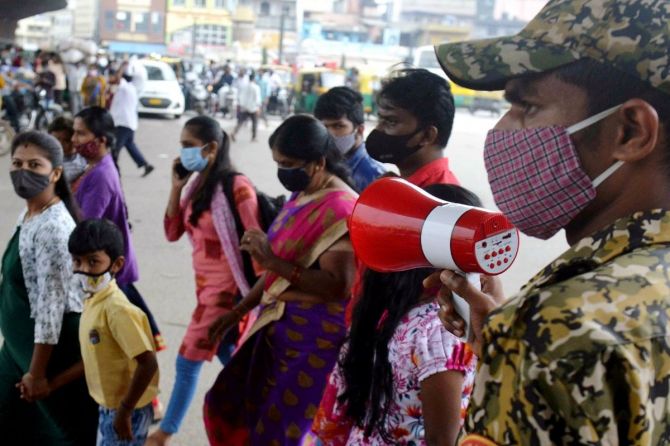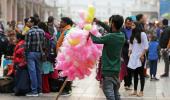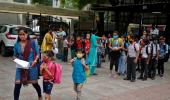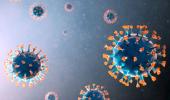The government on Friday warned about the declining compliance to mask usage in the country amid concerns over the Omicron variant of the coronavirus and urged people to follow COVID-appropriate behaviour and get vaccinated to prevent surge in cases.

Referring to an assessment by the Institute for Health Metrics and Evaluation, NITI Aayog member (health) Dr VK Paul at a press conference said the usage of masks in the country has declined to pre-second wave levels and 'in a way we have again entered a danger zone.'
The use of masks is declining, he pointed out, and said "from the point of view of protection capability, we are now operating at a low level...at a risky and unacceptable level."
"We have to remember that both vaccines and masks are important," Paul emphasised.
He said people must learn from the global situation.
Referring to a recent analysis by the World Health Organisation, joint secretary in the Union health ministry, Lav Agarwal, said the WHO has highlighted that public health and social measures compliance is declining with increase in vaccination rate.
"We need to diligently adhere to these public health measures in order to safeguard ourselves and those around us against COVID-19, the WHO has said," he said.
He said citizens must strictly follow COVID-appropriate behaviour to prevent surge in cases as being seen in European countries.
The government on Friday said 25 cases of the Omicron variant of the coronavirus have been detected in India so far and that mild symptoms have been noted in all the cases.
Clinically, Omicron is not posing a burden on the healthcare system yet, but vigil has to be maintained, it said.
Since November 25, the health minister has been conducting daily review meetings on various aspects of preparedness against COVID-19, including the new 'variant of concern', Omicron, Agarwal said.
The meetings are attended by the NITI Aayog, the principal scientific advisor to the government, the health secretary, the secretary of the department of biotechnology, the ICMR director general, the national technical advisory group on immunisation and the national centre for disease control, among others.
Several review meetings have been conducted with state and airport health officials at the level of the Union health minister and the health secretary to ensure increased surveillance, effective screening and follow up in the community for international travellers, increasing pace of vaccination and monitoring the upgrading of health infrastructure for COVID-19 across the country, Agarwal said.
The health secretary on November 25 had pre-emptively advised states to increase surveillance at airports in view of the new variant, and passengers from 'at risk' countries were asked to undergo rigorous screening and testing, he said.
The government has asked states to send COVID-19 positive samples for genome sequencing and ensure continued adherence to 'test-track-treat', vaccination and COVID-appropriate behaviour, the official said.
On November 27, post the declaration of Omicron as a 'variant of concern', states were advised to increase surveillance at airports, increase testing and continue monitoring hotspots, Agarwal said.
They have been also asked to adopt a mission mode approach for reviewing health infrastructure preparedness, he said.
On November 29, the government advised states to ensure testing and tracking of all international passenger in the community, heighten testing, including whole genome sequencing, ensure monitoring of clusters reporting COVID-19 cases with specific focus on sentinel and surge surveillance, the joint secretary said.
It has asked states towards orienting people on effective implementation of COVID-appropriate behaviour as a tool against COVID-19, Agarwal said.
States have been advised on surveillance of respiratory distress cases in the community. The government has also advised regarding treatment in designated Covid facility with separate earmarked isolation area for Omicron patients, he said.
They have been advised to monitor re-infection, breakthrough infections besides ensuring prompt investigation by rapid response teams into new cluster of COVID-19 cases, he said.
Under the emergency COVID response package- II, states have been asked to assess the availability of healthcare infrastructure, including paediatric, such as ICU beds, oxygen beds etc, the official said.
They have also been asked to revisit existing home isolation protocol and strengthen monitoring mechanism through special teams, call-centres and e-Sanjeevani, he said.
"We have asked states to ensure proper functioning of PSA plants, ventilators, oxygen concentrators, oxygen cylinders and conduct refresher trainings on PSAs, ventilators, rational use of oxygen, PPEs, N-95, etc," Agarwal said.
They have been asked to ensure seamless hospitalisation processes and availability of ambulances, review availability of medicines and maintain buffer stock, he said.
"Our focus is to reduce exposure, stop transmission of the disease and stop the mortality in the country. We want to do this with community engagement," Agarwal said.











 © 2025
© 2025